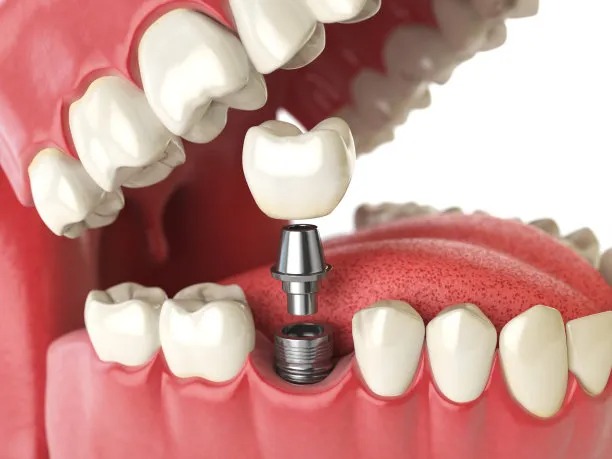Summary: Dental implants are an effective solution for individuals seeking to restore their smile and oral function after tooth loss. This ultimate guide provides a comprehensive overview of the benefits of dental implants, the detailed procedures involved, and essential aftercare tips. From understanding how implants improve one’s quality of life to navigating the surgical process and maintaining implant health, this article serves as a valuable resource for anyone considering this transformative dental solution. A bright, healthy smile is achievable with the right knowledge and care.
1. Benefits of Dental Implants for Your Smile

Dental implants offer numerous benefits that go beyond aesthetics. First and foremost, they provide a permanent solution for missing teeth. Unlike dentures, which need to be removed and cleaned, implants are anchored securely into the jawbone, allowing for more natural oral function. This stability not only improves the ability to chew and speak comfortably but also enhances overall confidence.
Another key advantage of dental implants is bone preservation. When a tooth is lost, the jawbone can begin to deteriorate over time, leading to changes in facial structure. Implants stimulate the jawbone, promoting bone growth and preventing further erosion. This quality not only maintains the shape of the face but also reduces the risk of future dental complications.
Moreover, dental implants contribute to oral health. Unlike traditional bridges that require altering adjacent teeth, implants stand alone without compromising surrounding teeth. This preservation technique aligns with best practices in dental care, ensuring healthier gums and overall dental hygiene.
2. Understanding the Dental Implant Procedure
The dental implant procedure is usually performed in multiple stages, beginning with a thorough examination and treatment planning. Initially, dental professionals assess the patient’s dental and medical history. Advanced imaging techniques, such as X-rays or 3D scans, allow for precise mapping of the jawbone, ensuring the implants are placed in optimal locations.
Next, the actual surgical procedure involves placing the titanium implant into the jawbone. This minor surgery is often done under local anesthesia or sedation to ensure comfort. Post-surgery, a recovery period is necessary for osseointegration, where the implant fuses with the bone to create a stable foundation.
The final step involves placing custom-designed crowns on the implants, restoring the natural appearance of the teeth. Throughout the process, ongoing communication with dental professionals is crucial for monitoring progress and ensuring the best possible outcomes.
3. Essential Aftercare for Dental Implants
Aftercare is vital for the longevity and health of dental implants. Following the initial placement, patients should adhere to specific post-operative guidelines to ensure proper healing. This includes consuming soft foods for a few days, practicing good oral hygiene, and avoiding strenuous activities that could strain the surgical site.
Regular dental check-ups are also paramount in maintaining implant health. These appointments allow dental professionals to monitor the implants for any signs of infection, ensuring that they remain stable over time. Routine cleanings ensure plaque buildup is managed, mitigating potential complications.
Additionally, lifestyle choices can impact the success of dental implants. Avoiding habits such as smoking and excessive alcohol consumption can improve healing and enhance the longevity of implants. A balanced diet rich in vitamins and minerals further supports oral health, allowing patients to enjoy their beautiful smiles for years to come.
4. The Cost and Insurance Aspect of Dental Implants
Understanding the cost of dental implants is essential for potential patients, as it plays a significant role in decision-making. While the initial expense can be higher than other restorative options, the long-term benefits often justify the investment. Dental implants typically have a longer lifespan, leading to lower replacement costs over time.
Many dental insurance plans are beginning to cover a portion of the costs associated with implants, recognizing their importance for oral health. Patients are encouraged to check with their insurance providers to understand their coverage options. Additionally, financing plans offered by dental clinics can make treatment more accessible.
Investing in dental implants not only improves ones quality of life but also boosts self-esteem and enhances personal relationships. With the right information and financial planning, achieving a bright and healthy smile through dental implants is within reach for many individuals.
Summary:
Dental implants offer a revolutionary solution to tooth loss, providing both functional and aesthetic benefits. Understanding the complete process—from the advantages and procedures to aftercare—enables patients to make informed decisions about their dental health. By integrating good habits and maintaining regular follow-ups, individuals can relish their new smiles for a lifetime.
This article is compiled by Vickong Dental and the content is for reference only.
Vickong Dental
Vickong Dental is a large medical group established in Hong Kong in 2008 by professors from well-known medical universities in Guangdong and Hong Kong, as well as medical doctors from key national '985' universities (including Master's supervisors and senior professors). The chain of branches brings together expert dentists with PhDs and Master's degrees from Hong Kong and Mainland China, committed to providing high-quality dental treatment.
"Vickong Dental Practices the University Motto of 'Healing and Serving Society,' with a Stable Operation for Sixteen Years. It Has Been honored with Hong Kong Enterprise Leaders's Choice,' and is a Global Trusted Implant Center for the Nobel Implant System. Recommended by Hong Kong Metro Broadcast and Guangdong Television, it Serves Customers from Over Thirty Countries and Regions, Gaining the Trust and Favor of Citizens from the Guangdong-Hong Kong-Macau Greater Bay Area and Surrounding Cities.

Thousands of customers' unanimous praise
The most recognized and highly recommended dental service by customers in the Guangdong-Hong Kong-Macau Greater Bay Area
We Ensure You Receive Detailed Care and Attention Here
Hong Kong standards, Shenzhen prices, Your Trusted English-speaking dentists

Vickong Dental Medical-Grade Instrument Disinfection Process
Vickong Dental Medical-Grade Instrument Disinfection Process

Vickong Dental Chain: A Warm and Comfortable Environment for Treatment






Appointment Hours

Q&A
Why choose Vickong Dental?
Vickong Dental practices the university motto 「Medicine to Benefit Society」, with each branch bringing together highly qualified dentists with doctoral and master’s degrees from Hong Kong and the Mainland, and has maintained seventeen years of steady operation。Recipient of 「2024 Hong Kong Enterprise Leaders Brand」, 「2025 Hong Kong Enterprise Leaders Brand」, a Nobel Biocare Global Trusted Implant Center, and a brand recommended by Metro Radio Hong Kong and Guangdong TV。
To date, we have served customers from more than thirty countries and regions,earning exceptionally high word-of-mouth recognition and trusted recommendations from residents across the Guangdong-Hong Kong-Macao Greater Bay Area and surrounding cities
We have eight major branches in Zhuhai、Shenzhen,and a consultation and service assurance center in Hong Kong,so you can book a free consultation at any time for any questions,which is very reassuring.
If I do not accept the quotation after the CT scan, will I be charged??
No! As long as the actual treatment has not started, you will not be charged any fees.
Will there be any additional charges during the treatment process?
No, there won’t be any additional charges. Before treatment begins, we will clearly explain the treatment plan and its corresponding fees. Only after the patient agrees and signs the consent form will we proceed with the dental service.
Can I pay in Hong Kong dollars?
Yes. Vickong Dental accepts payment in Hong Kong dollars. The amount will be converted based on the exchange rate of the day, and the applicable rate will be clearly communicated to you in advance.
Can I reschedule my appointment at any time?
Yes. Please contact us via **WeChat** or **WhatsApp** as early as possible, providing your original appointment time and details, along with your preferred new date and time slot for rescheduling.













